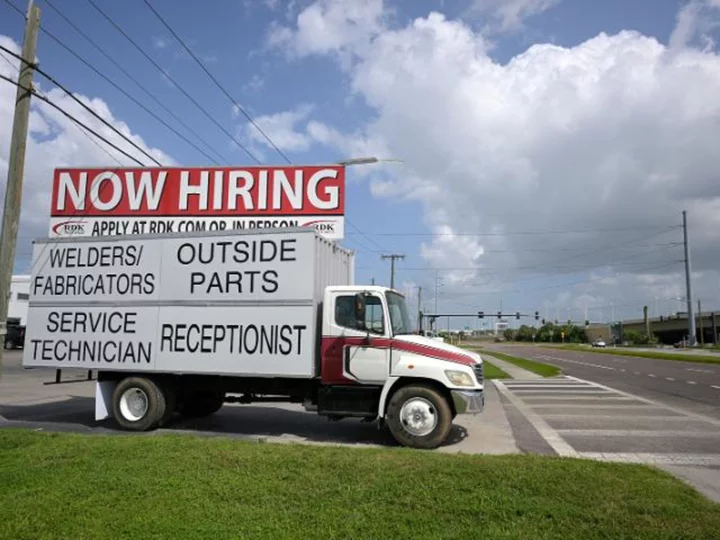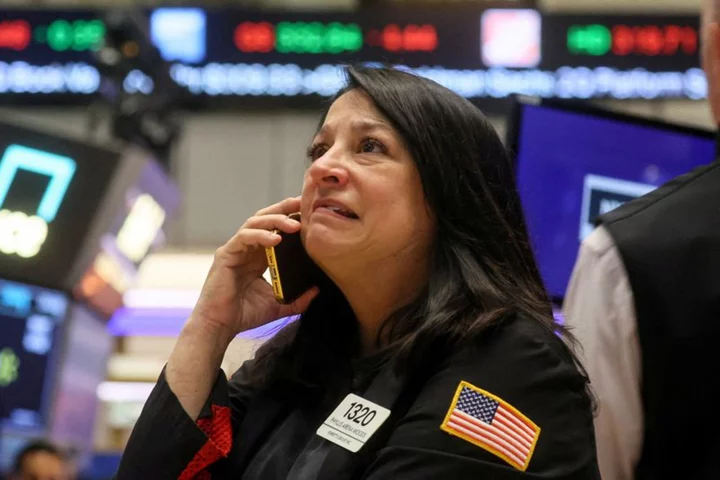Welcome to jobs week.
Investors are eagerly anticipating a slew of news about the health of the US labor market over the next few days.
The Bureau of Labor Statistics kicks things off on Tuesday with the Job Openings and Labor Turnover Survey report for July. On Wednesday, we get the ADP National Employment Report for August.
On Thursday, Challenger, Grey & Christmas releases its August job cuts, which provides information on corporate layoffs. And Friday brings the main event: the official government unemployment numbers for August.
The labor market has been incredibly resilient over the past two years. That sounds like a good thing — and it is for Americans who are facing higher prices on everything from groceries to rent.
But the Federal Reserve isn't very happy about it. In order to fight inflation, it needs to cool the economy, and when people work and earn larger salaries, they buy more stuff. All that economic activity does the opposite of what the Fed is aiming for. Higher labor costs can also get passed on by companies to consumers, which means higher prices.
Before the Bell spoke with Richard Wahlquist, CEO of the American Staffing Association, a trade association representing the staffing and recruiting industry, about what he's seeing on the ground and his outlook for the labor market.
This interview has been edited for length and clarity.
Before the Bell: In his speech from Jackson Hole, Wyoming on Friday, Federal Reserve Chair Jerome Powell said that getting inflation back to 2% would require "some softening in labor market conditions." Are you seeing that, and do you agree with him?
Richard Wahlquist: In late July the economists at the Fed said that they were no longer forecasting a recession. That really caught us off guard. That was a pretty strong and declarative statement, and employers cautiously took that as a sign of optimism that things were moving in the right direction — that perhaps they would take their foot off the pedal on these interest rate hikes.
One of the things that struck me in Powell's Jackson Hole remarks was when he said "we are navigating by the stars under cloudy skies." That essentially means that we can't see, that we're flying blind. I think what we've got here is the blind leading the economically sight impaired.
So we go to the data itself: Labor markets continue to show resilience. But the pace of job creation and demand by employers for flexible labor, temporary, contract and full time jobs, while still strong, has definitely slowed.
Tell me about the ASA Staffing Index, which tracks weekly changes in temporary and contract employment.
The ASA Staffing Index is a real-time snapshot of employment. We've seen that index trending down pretty consistently. Staffing jobs have decreased by about 4.7% year-to-year, over the past four weeks. Last year was a breakout year for so many segments of the economy, and employers across most sectors were exhibiting hiring exuberance. This year we've seen a moderation, but hiring is still well above pre-pandemic levels. The message is that labor markets remain resilient. There is demand across most sectors, but businesses are becoming cautious. When positions open up, they aren't filling them as immediately as they were a year ago.
How does your index correlate to government unemployment numbers?
If you take a look at what's happening with temporary contract employment as a leading employment indicator, you'll see that our index has been trending down. We've seen months of this — that's a signal something is happening in labor markets, with business confidence, optimism and demand. Typically it's a predictor that there are dark clouds on the horizon and that we may be in for an economic downturn, just as an uptick in temporary hiring is a very positive signal in terms of employment. So we think that this is kind of probably a moderation in terms of overall employment.
So this is a leading indicator?
Yes, and what I'm hearing from CEOs and our member companies is that they feel as though they've been in the midst of a rolling recession — meaning that certain sectors have already felt the downturn. We saw the headlines around tech layoffs beginning at the end of last year and continuing through the first quarter, in terms of overall US employment. But now I'm hearing from CEOs that they're feeling that we may have turned the corner and that we may begin to see upticks again in employment for the third quarter into the fourth quarter and certainly for 2024. So I think we may have seen a trough in terms of temporary employment and we could be seeing now the beginning of the upturn.
A severe drought is affecting the Panama Canal. That's not good for supply chains
Panama is about halfway through its rainy season right now, and one of the wettest countries in the world is having one of its driest seasons on record, reports my colleague Alicia Wallace.
The lack of abundant rainfall is leading to lower water levels and putting a squeeze on a critical international shipping artery: Canal authorities have imposed restrictions on vessel weights and daily traffic.
Just this week, the Panama Canal Authority extended those restrictions for at least another 10 months.
While the direct impact to US manufacturers, retailers and consumers appears to be minimal right now, the potential for broader disruption is growing.
Whether driven by climate, weather, geopolitics or some other unforeseen circumstance, any increase in maritime choke points could spell trouble for the global supply chain networks that have run much more smoothly since their pandemic-era upheavals.
"About 80% of our merchandise in trade is moved via vessel over the water," said Janelle Griffith, North American logistics leader for insurance brokerage and risk advisory firm Marsh. "So we actually should be concerned when we see those sorts of blockages. And, yes, it does have global ramifications ... when you have a blockage in one part of the supply chain, the rest of the supply chain is automatically affected."
Large US tech companies face new EU rules
The world's largest tech companies must now comply with a sweeping new European law that affects everything from social media moderation to targeted advertising and counterfeit goods in e-commerce — with possible ripple effects for the rest of the world, reports my colleague Brian Fung.
The unprecedented EU measures for online platforms will apply to companies including Amazon, Apple, Google, Meta, Microsoft, Snapchat and TikTok, among many others, reflecting one of the most comprehensive and ambitious efforts by policymakers anywhere to regulate tech giants through legislation.
The rules seek to address some of the most serious concerns that critics of large tech platforms have raised in recent years, including the spread of misinformation and disinformation; possible harms to mental health, particularly for young people; rabbit holes of algorithmically recommended content and a lack of transparency; and the spread of illegal or fake products on virtual marketplaces.
For all platforms, the law bans data-driven targeted advertising aimed at children, as well as targeted ads to all internet users based on protected characteristics such as political affiliation, sexual orientation and ethnicity. The law bans so-called "dark patterns," or the use of subtle design cues that may be intended to nudge consumers toward giving up their personal data or making other decisions that a company might prefer.
The law also requires all online platforms to offer ways for users to report illegal content and products and for them to appeal content moderation decisions. And it requires companies to spell out their terms of service in an accessible manner.
For the largest platforms, the law goes further. Companies designated as Very Large Online Platforms or Very Large Online Search Engines will be required to undertake independent risk assessments focused on, for example, how bad actors might try to manipulate their platforms, or use them to interfere with elections or to violate human rights — and companies must act to mitigate those risks. And they will have to set up repositories of the ads they've run and allow the public to inspect them.









